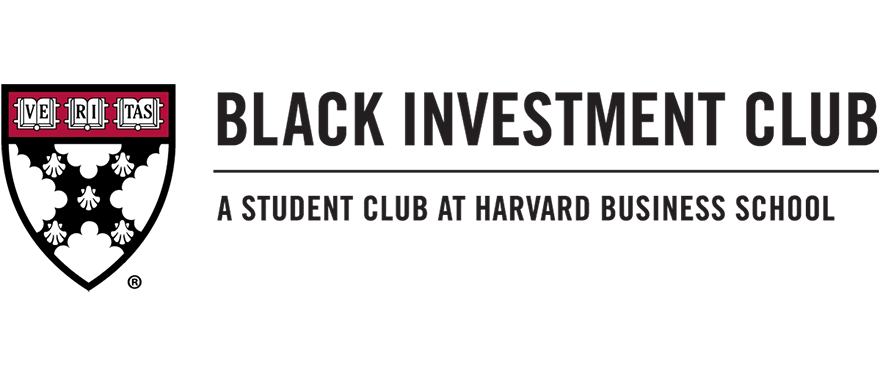INSPIRED BY RECENT EVENTS
The protests against the unjust murders of George Floyd, Ahmaud Arbery, Breonna Taylor, and countless others since have mobilized the nation to take a stand in support of the Black Lives Matter (BLM) movement and against the many policies that have allowed structural and institutional racism to become so entrenched in American life. Although the past few months have been difficult on myself and other members of the Black community, I am cautiously optimistic that the BLM movement can create lasting and sustainable change. Recent events have also caused me to reflect on my own journey this year with the Black Investment Club and reminded me why I was so determined to get this initiative off the ground before leaving HBS.
BIRTH OF AN IDEA
In the fall of 2019, during my second year of business school, I started the Black Investment Club at HBS along with my classmate Paul Ampofo (MBA 2020). The idea came to me after I saw many of my Black classmates become discouraged by being left out of recruiting processes altogether or repeatedly rejected from the small pool of coveted roles in venture capital and private equity - despite having the necessary qualifications, technical skills, and networks required for the job. I thought to myself, “if students at Harvard Business School - one of the leading feeders for venture capital/private equity roles in the world - are facing this level of resistance breaking into the industry, there must be a serious issue here. What on earth is going on?

Brian Sykes (MBA 2020) and Paul Ampofo (MBA 2020)
THE PROBLEM
The combination of systematic bias and outright prejudice have played a huge role in preventing underrepresented founders and investors from receiving equitable treatment in the investment ecosystem for decades.* Despite increased attention in recent years, the fact remains that Black founders receive a mere 1% of VC funding. For Black women, the numbers are even worse.
One reason for this is that general partners at venture capital firms, those who hold the power to write checks to invest in companies, remain overwhelmingly white and male (81% of VC firms don’t have a single Black investor. Not one). Due to a notorious reliance on personal networks for deal sourcing, most VCs lack the network infrastructure necessary to successfully find and mentor Black talent. And even once they do, many investors are unaware of the biases that create barriers to actually investing in Black founders.
It is no surprise that the rest of the investing world also severely lacks racial diversity. According to Kanyi Maqubela, managing partner of Kindred Ventures, “the industry’s reliance on personal relationships perpetuates a system of gate-keeping that is almost designed to keep Black investors out.”
Take private equity, for example - everyone knows Robert Smith, Founder of Vista Equity, but how many other senior Black private equity professionals can you name, really? No doubt, the list is small.
Hedge funds are no different. Despite recent evidence showing hedge funds led by females or minorities performed better than their non-minority counterparts, the industry still suffers from a severe lack of diversity in ownership. According to a 2017 study authored by HBS Professor Josh Lerner, firms owned by women and minorities control less than 1% of total industry assets. Less than one percent.
This is the problem that our club has set out to address.
“The industry’s reliance on personal relationships perpetuates a system of gate-keeping that is almost designed to keep black investors out” - Kanyi Maqubela
INTRODUCING THE BLACK INVESTMENT CLUB
The goal of The Black Investment Club is to address the massive underrepresentation of Black investors in venture capital, private equity, and investment management by creating a focused organization aimed at empowering and advancing the interests of our community. By starting this club, we are sending the signal loud and clear that we will no longer tolerate being shut out.
Given the investing world’s tendency to rely on personal networks not only to win deals, but also to find new talent, we knew it was imperative to build a community just for us. A community where we can:
● Network directly with other Black MBA students, alumni, and investment professionals
● Get the technical training and interview prep necessary to land placements with top firms
● Bring people together to have the difficult, honest conversations necessary in order to truly advocate for meaningful change
Just as the recent cries for racial justice demand immediate and sustainable change, the Black Investment Club demands that we see changes in our industry. And we want to see them now - we are done waiting.
We went out and gathered over 120 signatures from our classmates in support of our new club proposal in less than 12 hours – vastly exceeding the number of signatures needed by over 200%. We knew this couldn’t wait until next year – it needed to happen now.
Thankfully, our classmates agreed.
Our Vision Going Forward
The Black Investment Club officially launched during the spring 2020 semester, and since that time it’s been our mission is to empower the next generation of senior Black investment professionals by making it easier for firms to hire and elevate Black talent. Like President Obama once stated, “change will not come if we wait for some other person or some other time”. We have a unique opportunity to eliminate the barriers to that prevent Black students from breaking into the investing world. By curating programming specifically tailored to the needs of Black investors, we hope to create an easier path to success for Black HBS students interested in investing careers. On a tactical level, we plan to achieve this in several ways:
● Regular events with HBS Black investment alum to facilitate career advancement and mentorship for current students
● Creating asset-class huddle groups to make sure everyone has the specific tools necessary to excel in their desired specialty
● Collaboration with other investment clubs to ensure their programming has an orientation towards diversity and equity, especially for Black investors
Despite the racial injustice many of us have faced, we are still aware of the privilege we possess as Harvard students, and we hope to use our platform to drive positive change in the investment community. I truly believe that big things are ahead for the club in the years to come.
It is our hope that the Black Investment Club can build on the foundation created by other non-profits promoting diversity in business (SEO Alternative Investments Fellowship Program, The Toigo Foundation, Management Leadership for Tomorrow and others) and by serving as a recruiting pipeline for diverse candidates in business education and a variety of business focused fields, including venture capital, private equity and financial services. Interested in learning more? Please visit our club website.
*Lyons-Padilla, Sarah, et al. “Race Influences Professional Investors’ Financial Judgments.” Proceedings of the National Academy of Sciences, vol. 116, no. 35, 2019, pp. 17225–17230., doi:10.1073/pnas.1822052116

